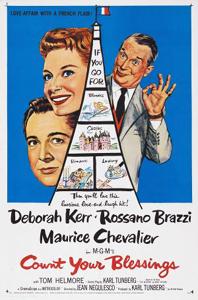Count Your Blessings (1959 film)
| Count Your Blessings | |
|---|---|
 Original film poster | |
| Directed by | Jean Negulesco |
| Written by | Karl Tunberg |
| Based on | The Blessing by Nancy Mitford |
| Produced by | Karl Tunberg |
| Starring | Deborah Kerr |
| Cinematography | George J. Folsey Milton R. Krasner |
| Edited by | Harold F. Kress |
| Music by | Franz Waxman |
| Distributed by | Metro-Goldwyn-Mayer |
Release date | April 23, 1959 (US) |
Running time | 102 minutes |
| Country | United States |
| Language | English |
| Budget | $2,311,000[1] |
| Box office | $1,710,000[1] |
Count Your Blessings is a 1959 drama film made by Metro-Goldwyn-Mayer. It was directed by Jean Negulesco, written and produced by Karl Tunberg, based on the 1951 novel The Blessing by Nancy Mitford. The music score was by Franz Waxman and the cinematography by George J. Folsey and Milton R. Krasner. The costume design was by Helen Rose.
The film stars Deborah Kerr, Rossano Brazzi and Maurice Chevalier with Martin Stephens, Ronald Squire, Patricia Medina and Mona Washbourne.
The film was shot in London and Paris.
Plot
While visiting Grace Allingham in wartime London at the behest of Hugh Palgrave (Hughie), his friend, Charles is charmed by her and abruptly proposes marriage. They marry, but before their honeymoon, Charles reports back for military duty.
He reportedly is shot and taken prisoner. Grace waits for his return while raising their young son, Sigi. Charles returns after nine years, but over time, Grace comes to learn that during his long absence he has been seeing other women. She turns for comfort to her old love, Hughie.
A divorce seems imminent while eight year-old Sigi is torn between the two parents and their very different ways of life. Because of their commitment to him, Grace and Charles ultimately reconcile.
Box office
According to MGM records the film earned $810,000 in the US and Canada and $900,000 elsewhere resulting in a loss of $1,688,000.[1]
See also
References
External links
- 1959 films
- 1959 drama films
- American films
- American drama films
- English-language films
- Films scored by Franz Waxman
- Films based on American novels
- Films directed by Jean Negulesco
- Films based on British novels
- Films shot in London
- Films shot in Paris
- Metro-Goldwyn-Mayer films
- Films set in London
- World War II films
- 1950s drama film stubs
